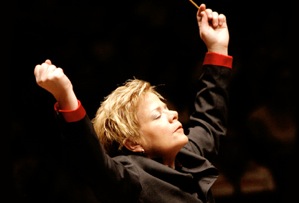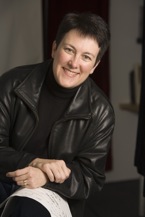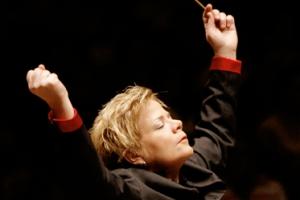Every year around this time, something remarkable happens in Santa Cruz: The annual Cabrillo Festival of Contemporary Music convenes, and this sunny beach town best known for its boardwalk becomes a thriving new-music laboratory. Under Music Director Marin Alsop, the two-week festival attracts an impressive array of top composers, musicians, and aficionados eager for a total immersion in the music of our time.

The 2010 season — the festival’s 48th — promises a characteristically packed lineup. From August 1 to 15, audiences can hear the popular Kronos Quartet and the exciting new-music sextet eighth blackbird; the premiere of Michael Hersch’s Symphony No. 3; Pulitzer Prize–winner Jennifer Higdon’s On a Wire; new works by British composers Mark-Anthony Turnage and Anna Clyne; composer Kevin Puts appearing as soloist in his own Piano Concerto, titled Night; John Adams’ City Noir; and Philip Glass’ Cello Concerto, with Wendy Sutter as soloist.
In addition to the concerts, there are free events, including a family concert with an “instrument petting zoo”; a “creativity tent” for kids; a two-day open air festival of world music, art, and food; open rehearsals; and meet-the-composer discussions and preconcert talks.
At the center of it all is Alsop, an indefatigable new-music specialist who, in addition to conducting duties, serves as Cabrillo’s intrepid programming mastermind. Each summer, the award-winning maestra returns to Cabrillo with a variety of emerging works that please the faithful while turning first-timers into lifetime subscribers.
“Cabrillo has always been devoted to presenting innovative, living composers, and works that try to break down barriers,” Alsop remarked in a recent phone call from her home in Denver. “My personal approach is really to focus on the creative process and try to offer everyone — from our performers to our audience members to our listeners on the radio — access points to that process. That means having living composers in attendance; and having that much creative juice going is always very exciting.”
A Taste for Adventure
The pioneering spirit has been essential to the Cabrillo Festival from the beginning. Founded in 1961 in a nearby coffeehouse, the organization began with an eclectic range of offerings, from chamber programs to Stravinsky operas. West Coast composer Lou Harrison was a guiding spirit, and Gerhard Samuel, who became the festival’s first music director in 1963, conducted the inaugural concert when the festival expanded into a proper season at Cabrillo College. Samuel was succeeded by Carlos Chavez, Dennis Russell Davies, John Adams, and, in 1992, Alsop. Throughout its history, Cabrillo has presented hundreds of premieres, delving deeply into the music of composers such as Adams, Glass, John Cage, Elliott Carter, William Bolcom, Osvaldo Golijov, and Pauline Oliveros, among others. The festival has won ASCAP’s Award for Adventurous Programming every year since 1982.
Alsop, who is also music director of the Baltimore Symphony — and the first woman to head a major American orchestra — says she looks forward to the festival all year. “Cabrillo is my artistic oasis,” she explains. “To be able to immerse myself in the music of our day, and be among musicians who are clearly inspired by this repertoire, is something very special and unique. While I am committed to programming contemporary music throughout the season, it’s a different context, always. I think there’s a different esprit when everyone is in a place to focus on new music, when every single musician is there for that kind of participation. That experience is unique to Cabrillo.”
Apparently, musicians share her view of the experience. Drawn from orchestras around the country, the Cabrillo ensemble is a loyal group — remarkable, considering that the festival takes place during what is traditionally downtime for orchestra musicians. Alsop notes that turnover has been extremely low, with a return rate of “upwards of 90 percent year after year.
“Our recruiting process has been very successful,” she says. “It’s all done from recommendations from other musicians, for people they love to work with. I’ve found that this is the best audition process I’ve ever had. It creates an orchestra of committed, high-energy musicians. They come fully prepared. It’s not about the money, it’s not about the trappings. It’s all about the music.”
Composers’ Heaven
The Cabrillo experience is rare for composers, as well. They’re integral participants in the process; this year, all 13 featured composers will be in attendance. “It’s great for the composers, because composing is usually a solitary existence,” says Alsop. “Here, they finally get to be among other composers. That’s very inspiring.”
For Alsop, the key to successful programming is blending composers well-known to the Cabrillo audience — names such as Glass, Adams, and Higdon — with emerging composers and those who are still relatively unfamiliar on the West Coast.
She cites Turnage as an example, a composer who has filled residencies with the City of Birmingham Symphony, Berlin Philharmonic, and English National Opera. Alsop will conduct three of the British composer’s works this month: Scherzoid, Chicago Remains, and Drowned Out. All are West Coast premieres. “Mark is very well-known in the U.K., and he’s been composer in residence in Chicago this year,” she says. “But, for some reason, his music doesn’t get performed as much on the West Coast. I really like his vocabulary — it’s very distinctive, but very current. His music seems hip to me. Scherzoid is an awesome piece — like a scherzo that’s had way too many drugs.”
Alsop is also looking forward to conducting Adams’ City Noir. It’s the newest major work by the Berkeley-based composer, with whom Alsop has had a long association; her recent recording of his opera Nixon in China was released this year to wide acclaim. (See SFCV’s review.)
Another high point will be Higdon’s On a Wire. Co-commissioned by Cabrillo and the Atlanta Symphony, the work was written for eighth blackbird, which premiered the work in Atlanta in June.
Family Feeling: A Gathering of Idealists
Higdon, who won a 2010 Grammy in addition to her Pulitzer, and who is one of the most frequently performed American composers, makes her fourth visit to Cabrillo this year. The Philadelphia-based composer has just completed a busy season of premieres and residencies. “But I’ve been kind of eyeing Cabrillo as the prize at the end,” she says. “That’s how it always feels. I can’t wait to get there!”
On a Wire, says Higdon, illustrates the kind of relationships that Alsop fosters between composers and performers. “This piece is really designed to highlight eighth blackbird,” she says. “Because they’re so good at moving around the stage, and their performing is so theatrical, I decided to do something unusual — I have all of them playing inside the piano at various points. It’s quite a virtuosic piece, very challenging for the players, and the effect is quite dramatic.”
Higdon has written three other works for eighth blackbird, and says her admiration for the sextet continues to grow. “I’m blown away by their musicianship,” she says. “I’ve got enough of a history with them that I’ve gotten to know their playing very well.”
Five of the six members of eighth blackbird play in the Cabrillo orchestra, she adds. “This is their time off, and what do they do?” says Higdon. “They come to play at Cabrillo. That says a lot about the festival. Everyone who’s there really wants to be there. It’s like the ideal orchestra.”

Higdon, whose Percussion Concerto will appear on Cabrillo’s Aug. 7 concert (with Colin Currie as soloist), says it’s rare to find an orchestra so committed to new music. “Normally in an orchestra, you’ll have some players who don’t want to do anything they have to practice,” she says. “They only want to do works they’ve already played a lot. That doesn’t happen at Cabrillo. The level of playing is great, and Marin is just amazing. She can do anything, and the musicians respect her. The combination is ideal, and the audiences are so enthusiastic. It’s a win-win-win for everybody.”
Alsop’s international stature continues to grow, and she recently renewed her contract with the Baltimore Symphony through 2015. But she allows that Cabrillo has its own special vibe. “There’s a bumper sticker in Santa Cruz that says, ‘Help keep Santa Cruz weird,’” she notes. “I love that. It’s nonjudgmental; it’s all about experiencing life in the moment. It’s a great place to make art.”

